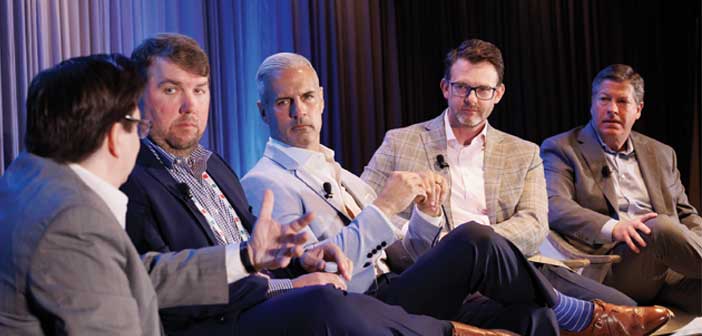At this year’s Hunter Hotel Investment Conference in Atlanta, Gregg Wallis, senior editor, Hotel Business, moderated “Managing Through Uncertainty,” with panelists Beau Benton, president, LBA Hospitality; Jay Burnett, chief investment officer, GF Hotels & Resorts; Brad Rahinsky, president/CEO, Hotel Equities; and Grey Raines, managing partner, Raines Company. Here, the management company executives share their thoughts on some of the issues facing the industry.
We have seen some M&A activity among management companies. Why are we seeing these types of mergers? Do you see that as a trend that will continue?
Benton: I believe there are two primary reasons. First, hotel management has gotten exponentially more complicated. The cost of the tools and human capital needed to effectively manage hotels has skyrocketed. You must have scale to make professional hotel management profitable. Second, the stress of managing through the pandemic caused several operators to rethink their priorities. Some operators have decided to focus their time and resources on development. That has led to a bunch of smaller companies either selling their management division or partnering with a larger operator.
Burnett: These mergers, often positioned as strategic alliances, typically involve one management company acquiring another or taking over the management function of an owner/developer/operator. From the acquiring company’s point of view, these mergers are a good way to build scale and critical mass as a third-party manager. This scale is necessary due to the accounting, revenue management, e-commerce, technology, sales and regional management overhead required to be a competitive hotel manager today.
To be sure, some of this activity is also motivated by the need to show consistent annual or quarterly growth to satisfy private equity investors or perhaps position for a future IPO. As for the company being acquired, it can represent a good way for the principals of a mature company to achieve an exit strategy or at least take some cards off the table, realizing some of the value they have created over the years.
For traditional owner-operators, it can be a good way to eliminate the necessary distraction of operating hotels. I’m seeing the latter particularly in some second-generation-led companies, where the principals are content to let the day-to-day go into trusted outside hands so they can focus efforts on building their business through acquisitions and development. This trend of consolidation is common in a maturing industry, and I suspect we will see more big announcements this year.
Rahinsky: Scale has always mattered in our industry, but never more so than today with the ongoing war on talent and the continuous cost increase to operate our assets—particularly on the wage, procurement and insurance front. Our industry is still incredibly fragmented and the ability for additional, value-add strategic consolidation will continue. Hotel Equities has brought in six partnerships in the past 30 months, creating an aligned group of companies and principals whose collective genius and experience are peerless in our space and creates real lift in operational efficiencies and revenue enhancement capabilities.
Raines: When companies want to grow, they only have a few options to go about it. It’s much easier for these larger companies to acquire smaller firms than to grow organically. For an M&A to be successful, though, it has to be strategic and intentional. Both companies must also be coming together for the right reasons, and it must make sense for all stakeholders. We’ve already seen some deals announced this year, including our acquisition of HP. We’ll likely see more in the coming months.
The labor situation in the hospitality industry continues to be top of mind with companies trying to find the best solutions to attract and retain workers. What are some of the things that are working for you?
Benton: You have to be creative and flexible. What works in one market may not work in another. While maintaining our traditional bonus plans that are tied to overall hotel performance, we have introduced a number of what I would call behavioral bonuses. These are targeted on the spot bonuses used to try to elicit a desired response. For instance, in a heavy leisure market, the entire housekeeping team can earn a bonus for perfect attendance on a heavy checkout day. Referral and retention bonuses have also worked.
You also have to invest time and money in training of your future leaders. Give continuous feedback to them and paint that picture of their future growth.
Burnett: Offering competitive wages and benefits packages is always important to attract associates, but it cannot be overlooked that doing so is even more critical to retain talent.
Additionally, recognizing our employees for their hard work and achievements can go a long way in retaining staff. At GF Hotels & Resorts, training and development is a high priority. It builds the skill sets of our employees while giving them an opportunity to advance their careers within our company. Our GF CAP (Career Advancement Program) has been a companywide success as well as a powerful tool for retaining staff and creating loyalty. Nothing is more important than creating a positive workplace culture that values teamwork, open communication and employee feedback. A supportive and inclusive workplace culture is crucial to foster employee satisfaction and loyalty.
Rahinsky: Culture is trendy right now—a buzz word that’s been pasted on everyone’s website and office walls.
When you’ve led with culture for 34 years like Hotel Equities and understand the differentiator it creates and how that positively impacts all things hospitality inclusive of your bottom line, you invest in it heavily and ensure it stays healthy as you grow and evolve. World-class training and creating an aspirational road map for every one of your associates to help get them from point A to B on their professional journey will help ensure your attrition falls well below the industry averages, and your ability to retain that top talent that takes you from good to great is strong. It always goes back to the people.
Raines: We have always focused on creating a positive workplace for our team members. Having started our business in a small town in South Carolina and growing it to where it is today, we’ve kept our values intact, even as we’ve scaled and expanded. When hiring, we’re not looking to add talent to our organization: we’re looking to grow our family by adding new family members. After all these years, we’ve succeeded by following that mindset, treating our team members with respect, and providing them with the right opportunities to grow.
Coming into the year, there were a lot of opinions as to what travel would look like. How do you think it has been shaping up so far? How do you think it will go for the rest of the year?
Benton: Our year has been off to a terrific start. We continue to see growth in midweek as business travel extends its rebound. While weekend leisure has come down from the highs of the pandemic, it is still above 2019 levels. Our forecasts are still positive and above our budgeted growth. Our industry has done a great job of holding on to the ADR gains, and I don’t see that changing this year.
Burnett: Looking at our own portfolio of owned and managed hotels, we have performed very well to start the year despite some unique challenges posed by the capital markets and macroeconomic flashpoints. Our ADR has been on a remarkable upward trajectory, with double-digit year-over-year increases. We are optimistic that this positive trend in ADR growth will continue as midweek transient business and larger citywide groups are showing promising signs of recovery.
According to the latest data from STR, more than half of the global markets reported a remarkable RevPAR growth of more than 20% compared to pre-pandemic levels in 2019. This underscores the resilience of our industry and gives us confidence that the year will continue to be robust and finish as strong as it has started.
Rahinsky: 2022 finished strong—by most accounts, a record year in the categories we measure and deem mission critical to our success. We’ve taken that momentum and have come out of Q1 2023 with strong year-over-year gains and forward-looking traction with pace and future bookings creating yield and compression opportunities in Q2, Q3 and beyond. The Fed continuing to increase rates in an effort to slow the economy down will begin to affect discretionary and business-traveler spending. We’re stress testing our projections frequently to ensure we’re ready for whatever the macro economy may throw at us. It speaks to the need to own your markets so that if a slowdown in demand occurs, you are shifting share to ensure continued profitability.
Raines: Despite economic headwinds, the industry’s performance this year so far remains strong. People are traveling, and the demand is there. While we, like many others, remain cautiously optimistic about the future, there are things to pay close attention to in the coming months, including interest rates, inflation and geopolitical actions.


